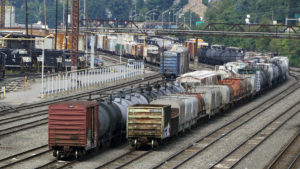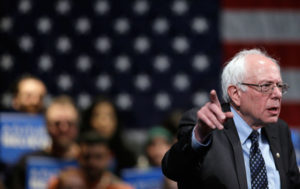Jeremy Corbyn’s Labour Party Is a Beacon in These Blighted Times
The party’s strong campaign in this Thursday's election—and the leadership under Corbyn—suggest positive developments that range beyond the U.K.’s borders.Labour Party leader Jeremy Corbyn at a political rally in London in April. (Alastair Grant / AP)
The U.K. general election on June 8 is an event of world-historical significance. In the wake of last year’s Brexit vote, the winner will oversee the renegotiation of Britain’s trade deals with the rest of the world, since it is no longer part of the European Union.
This is no small order. Trade has been central to the British economy for centuries, and U.K. firms remain a major force in the global economy. Also, as Americans learned from NAFTA, these deals can have a huge impact back home. Brexit represented a rupture in the political consensus that organized the 21st-century global economy. Will the next British government try to patch things up, reaffirming the status quo, or set a new course?
There is something else equally significant about the U.K. general election, though few analysts acknowledge it. The strong campaign being waged by the opposition Labour Party, under the leadership of Jeremy Corbyn, shows that a re-emergent radical left continues to gain popularity in western democracies. This success is hugely important, because any setback would unleash a new offensive by the right wing of the Labour Party to remove Corbyn. As I’ve argued previously in Truthdig, we need to nurture this newly vibrant left because it’s our best hope for getting our society back on track. The British establishment’s virulent reaction to the rise of Corbyn shows that it recognizes his politics of social solidarity as a mortal threat to its status, and wants nothing more than to kill this new left in its crib.
Fortunately, Labour has run an excellent election campaign, defying expectations by cutting the incumbent Tory party’s lead in the polls by more than half, and is poised to achieve a result that will confirm Corbyn’s leadership of the party and the maintenance of its left-wing program. This means that for the first time in decades, the main political opposition in one of the most influential countries in the world will stand firmly opposed to the dominant economic order of the post-Cold War era, commonly referred to as neoliberalism. This is a major development.
At the center of Corbyn’s success is a coherent vision for a new national economic model that would create more equitable wealth distribution, strengthen public services (including education), re-nationalize the trains and the postal service, invest heavily in renewable energy and other high-tech manufacturing, reduce poverty and truly strive for a society with equal opportunity for all. It’s a message of hope, a word Corbyn speaks frequently, echoing Obama in 2008. The sentiment rings true — Corbyn believes that a radical Labour Party government can be a revolutionary force helping birth a new, more just world.
Of course, Corbyn’s appeal, like his American doppelgänger Bernie Sanders, is rooted in an ability to communicate complex messages with clarity. Their style and manner contrast sharply; whereas Sanders is commanding, even brusque; Corbyn is charming and pensive. Nonetheless, Corbyn reiterates his major points with forceful simplicity. As with Sanders, it’s a standard two-step: Step 1, confirm, by citing easily recognizable evidence, the widespread sentiment that society is stacked against the average person to the benefit of the wealthy few; and Step 2, present your policies as common-sense solutions to rectify this injustice. Indeed, most of Corbyn’s proposals recall popular postwar social democratic policies. Corbyn’s mass rallies in the final days of the campaign are animated by tremendous optimism, much like Bernie’s in 2016. The audience is passionate about the message and thrilled by Labour’s rise in the polls.
This newfound popularity, however, masks the fact that Corbyn’s program is seen as a mortal threat to the current economic order. Corbyn merely proposes basic macroeconomic adjustments in an effort to help the average person, as well as using public investment to spark development, but if you read the business press, you’d think he was calling for the revolutionary overthrow of capitalism while sharpening his guillotine. And while it is true that in Britain, like America, a hugely disproportionate share of the wealth generated by society flows to the very rich while most people struggle to make ends meet, this is not a primary concern of those currently in power. Slight cosmetic changes are an option if the people get unruly, but nothing more. The “technocrats” who guide policy and investment (on behalf of their oligarchic sponsors) insist that Corbyn’s ideas are irresponsible, would suffocate growth and would lead to economic catastrophe.
So what is going on here? Is it simply the case that the neoliberal economic system is now operating on such small margins that it simply cannot countenance the allocation of funds for expanded social programs? If you judge by the establishment’s hysteria in the business press, to even propose such spending is diabolical. They’re basically saying we can’t afford popular largesse now — maybe in the future, but don’t plan for it. So much for decent schools or hospitals (unless, of course, you’re among the chosen few), and stop that nonsense about a living wage. In a world where just eight people own as much as does half the world, that seems on its face to be preposterous.
The establishment’s contempt for Corbyn often gets expressed over his many “radical” positions on noneconomic matters, such as his opposition to the Middle East wars and to nuclear weapons, his support of Palestinian rights, his strident anti-racism, etc. While these positions certainly irk some, I think the crux of the problem is something different. It’s about power.
What is really unacceptable is that Corbyn’s program empowers sectors of British society in a manner that would end the economic and political domination of finance (a.k.a. the City of London) and its allies, which have effectively ruled the nation for four decades. He not only calls for higher wages, the empowerment of unions, more protection for workers, higher taxes and more regulations on financial institutions, but also a key component of his economic program is a plan to reinvigorate “the real economy” through public borrowing to invest in research, development and education in order to spark high-tech manufacturing. Taken en masse, his program weakens the current top dogs at the same time that it strengthens potential rivals — not only students and workers, but also a revitalized manufacturing sector beholden to the state that you can bet will bolster and swell the ranks of unionized workers.
As the bank bailouts after the financial crash showed, finance and the current economic order are reliant on the state. The city of London knows that its publically financed insurance plan will disappear with Corbyn. Thus, Labour’s program is a blueprint, not only to end the reign of the 1 percent, but also the rule of finance. Hence the hysteria.
Evident from all of this is that Corbyn has a sophisticated and deep understanding of power relations in the U.K., and he recognizes the need to nurture potent countervailing forces (like using the state to reinvigorate the manufacturing sector) if he’s to have any hope of building a more just society. Another component of Corbyn’s strategy is mass mobilization. He is strongly allied with an array of social movements — he has his youth “army,” Momentum — plus, as the Labour leadership contests revealed, he has deep support from the rank and file of the party.
Is it all strong enough to directly challenge the dominant sectors of British Capital? To be honest, it’d be more than an uphill battle were Corbyn to pull the most spectacular of upsets and win this year.
Corbyn’s easiest path to 10 Downing Street on June 8 is through the Tories collapsing far enough to fail to win an outright majority, at which point the question will be whether the combined forces of Labour and the Scottish National Party (SNP) outnumber the Tories and are able to form a government. The trouble with that arrangement, in terms of implementing Corbyn’s vision, would not be the SNP so much as the substantial number of remaining Blairites in the Parliamentary Labour Party; it’s hard to imagine them supporting Corbyn’s more radical programs, which would mean they’d likely fall short of passage. But, hey, Corbyn would get to negotiate his days away on the post-Brexit treaties. Even if he’s bound to be frustrated there, too, at least he’d have center stage to articulate an alternative vision of globalization to the world.
In his excellent film “Hypernormalisation,” the British documentarian Adam Curtis argues that the political left in recent decades has become increasingly irrelevant because it has failed to offer a compelling vision of the future. This failure has occurred even as the current social and political order, propped up by the political establishment, is burdened by crises and grows increasingly unpopular.
In Corbyn’s platform we can begin to see such a vision come into view, much as it did when Jean-Luc Melenchon spoke during the French presidential campaign, and even during Sanders’ speeches during the 2016 U.S. presidential primary season. However, Corbyn needs to mobilize finance to invest in a stimulus program that will lead to its own disempowerment; hence this impasse in which very powerful forces remain committed to blocking the full realization of the society that Britons — and people throughout the world — so desperately need.
Nonetheless, Corbyn, along with the millions now passionately backing him, has put an alternative on the map. His vision of a world combats racism and prejudice of any kind, protects the planet, ends interminable wars, distributes political power and wealth more equitably, and saves our lives from overwork. He offers a guarantee of a living-wage job, access to world-class health care for everyone, and access to the best schools for all children, free through university. Finally, he guarantees vacation and leisure time by deploying the power of technology and human ingenuity to shorten the work week, making Britons free to live freely in a free society. Adam Curtis might object that the above peroration is of my own making, not a collectively shared understanding, but I’m guessing you’d struggle to find a Sandernista, Corbynista, or any of the partisans of the re-emergent left who wouldn’t instantly recognize this as a vision of the world they are fighting for.
If Labour doesn’t win this time around — and as well as Corbyn has done in the campaign, that prospect remains a longshot — he has certainly set a marker for the next contest. Five years is a long time for the rest of the British people to cling to a system out of balance and resist an honest, practical vision of a fair and prosperous middle-class society. Many people point to the 1979 election of Margaret Thatcher as launching the era of neoliberalism; perhaps on June 8, the beginning of its end will commence right where it began — in the U.K.
Your support matters…Independent journalism is under threat and overshadowed by heavily funded mainstream media.
You can help level the playing field. Become a member.
Your tax-deductible contribution keeps us digging beneath the headlines to give you thought-provoking, investigative reporting and analysis that unearths what's really happening- without compromise.
Give today to support our courageous, independent journalists.









You need to be a supporter to comment.
There are currently no responses to this article.
Be the first to respond.